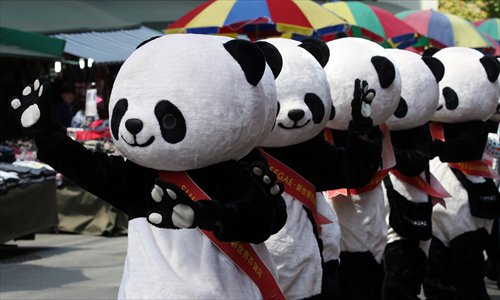HOME >> BUSINESS
S.Korea close to free trade deal with China
By Chen Qingqing and Park Gayoung Source:Global Times Published: 2015-5-26 23:23:05
Agreement set to slash tariffs on most goods

People dressed in panda costumes walk around a shopping market in Seoul, capital of South Korea, to attract Chinese tourists. Photo: CFP
South Korea took a step forward in implementing a free trade agreement (FTA) with China after the country's cabinet approved the deal on Tuesday.
Officials approved the FTA during a cabinet meeting held by South Korean President Park Geun-hye on Tuesday, according to the Chinese version of the website of Seoul-based Yonhap News Agency.
The FTA is expected to be officially signed by President Park and South Korea's National Assembly before the end of June, the report said.
Under the agreement, which covers 17 fields including e-commerce and government procurement, tariffs on over 90 percent of all the products traded between the two countries will be removed, according to an announcement published on the website of China's Ministry of Commerce (MOFCOM) in February.
South Korea will completely eliminate import duties on 92 percent of all products from China within 20 years, while China will remove tariffs on 91 percent of import goods from South Korea, Yonhap reported in February.
In addition, 310 categories of goods produced in the inter-Korean joint industrial complex in Kaesong, North Korea, will immediately benefit from a reduction or elimination of China's import tariffs.
Both Chinese and South Korean analysts believe the South Korean side will soon sign the FTA.
"I believe the official agreement will be signed in early June and the FTA will become effective in the second half of the year," Choi Yong-min, chief representative at the Beijing office of the Korea International Trade Association, told the Global Times on Tuesday.
Yuan Gangming, a professor with the Center for International Economic Research at Tsinghua University, echoed Choi's view. Yuan noted that the approval from South Korea's cabinet represented significant progress in implementing the FTA between the two countries.
"The FTA between China and South Korea will soon take effect as the South Korean government has shown its strong support for the deal," Yuan told the Global Times Tuesday.
But Yuan said promoting a free trade zone in Northeast Asia has always been more challenging than in Southeast Asia, as Japan is seen as a source of opposition.
After the US Senate passed a so-called fast-track bill on Friday, which could speed up approval of the Trans-Pacific Partnership (TPP), the South Korean government "felt pressure to accelerate the implementation of the FTA with China," Yuan said.
China and South Korea started negotiations on the free trade deal in May 2012. In November 2014, the two countries reached a substantial conclusion on the FTA, which was expected to take effect in 2015. The negotiations were completed in February 2015, MOFCOM said.
Once officially signed, the countries' respective legislatures will approve the free trade pact for implementation, which is expected to be in the second half of this year.
MOFCOM did not respond to requests for comment about the latest progress toward the FTA by press time. But Chinese Minister of Commerce Gao Hucheng said in March that the FTA was expected to be officially signed in the first half of this year.
China is the biggest destination for South Korean exports, accounting for 25 percent of South Korea's overall exports in 2014.
According to data from the Bank of Korea, South Korea's exports fell 2.9 percent year-on-year in the first quarter of 2015, with exports to China declining 1.5 percent from a year earlier
"South Korean companies targeting Chinese markets are excited about the FTA as the Chinese market is getting bigger and more important," Choi said. "But it's less important for the services and investment sectors, as they are not fully included in the FTA this time."
Services and investment sectors on both sides are subject to follow-up negotiations two years after the initial implementation of the FTA agreement.
Most industries in South Korea will benefit from the upcoming FTA, Bai Ming, a research fellow at the Chinese Academy of International Trade and Economic Cooperation, told the Global Times Tuesday.
However, agriculture and autos, both of which are seen as sensitive sectors, are expected to remain protected in South Korea, Bai noted.
Posted in: Economy